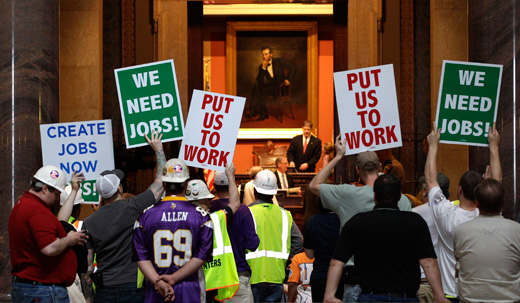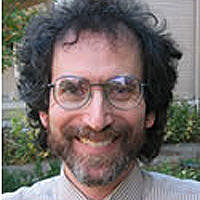
ST. PAUL, Minn. – When the Minnesota legislature convened Jan. 8, everything had changed – and nothing had changed.
What’s changed: For the first time in a generation, the Democratic-Farmer-Labor Party (DFL) holds majorities in both the Minnesota House and Senate and also holds the governor’s office. What hasn’t changed: The state faces structural budget deficits that the last several legislative sessions have failed to address.
For the state’s labor movement, winning back labor-friendly majorities in both houses of the legislature means 2013 won’t bring a cascade of extreme anti-worker legislative proposals like the last two legislative sessions under Republican control produced.
It also frees state unions to concentrate on their top priorities for Minnesota said Jennifer Schaubach, Minnesota AFL-CIO legislative director: Legislation to increase revenue and to create jobs.
“This past election was a scream loud and clear,” she said.
Minnesotans voted for legislative candidates who promised an end to budget shifts and gimmicks and to raise revenues fairly to invest in the state’s future. As the state’s economy climbs out of the recession, “we still desperately need jobs,” Schaubach said.
The Minnesota AFL-CIO will support a significant bonding bill to invest in state infrastructure and create jobs and also will support legislation to facilitate expansion of the Mall of America in Bloomington. “With this legislature we have a generational opportunity here,” commented Harry Melander, president of the Minnesota State Building and Construction Trades Council.
Bonding for job-creating investments to build and maintain the state’s infrastructure continues to be a top priority for the building trades, he said. “We hope to see that there are measures to provide a long-term solution to transportation funding, including transit,” he added.
“We would like to see a fair means of providing revenue to the state that’s fair to all,” Melander said. “Smart, reasonable change needs to be the message,” he emphasized.
Many of the newly elected members of the DFL majorities campaigned on paying back funds shifted away from schools and urged making new investments in education.
“The November elections have given us a chance to catch up on a decade of underfunding our schools,” said Tom Dooher, president of Education Minnesota, the state’s teachers union, a joint affiliate of the National Education Association and the American Federation of Teachers.
“If we’re going to have strong communities, we’ve got to have strong schools – and that means investing in them from early childhood to higher education,” Dooher said. “Our schools should not be a piggy bank for the state’s general fund,” he added.
“We need to pay pack the debt we owe our schools,” agreed Julie Bleyhl, legislative director for AFSCME District Council 5. “We have a backlog of funding problems that past legislatures haven’t dealt with and have put off,” she said, noting that track record puts an extra burden on the incoming legislature. “We have a structural deficit. We need to fix that.”
“We also want to make sure that revenue is raised in a fair way and those that can afford – the millionaires – pay their fair share as well,” Bleyhl said.
“We pride ourselves in Minnesota with our schools, our higher education, our transportation systems, our health care, and we need to continue to make investments to assure we not only stay competitive but we succeed,” she said.
“The change with the majority party provides an opportunity to do positive things for Minnesotans, for working families, to improve the economy, and to improve public services and programs in the state,” Bleyhl said.
“Union members and working families need to continue to communicate with their legislators and their co-workers,” Bleyhl urged. “Continue to stress the importance of raising revenue and making investments in the state of Minnesota to provide for a prosperous future and move the economy forward.”
“The most important thing is getting people to work,” said Kyle Makarios, director of government affairs for the North Central States Regional Council of Carpenters.
Steve Share is Minneapolis Labor Review editor
Photo: Construction workers rally for jobs outside the Minnesota House at the State Capitol, May 3, 2012, in St. Paul, Minn. Jim Mone/AP












Comments